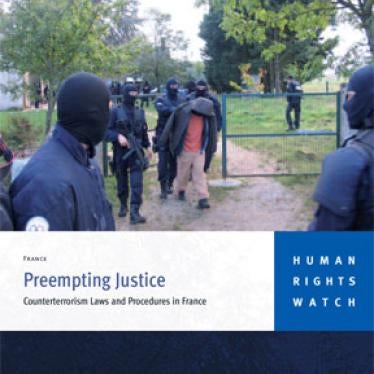During his four days in police custody, Emmanuel Nieto was subjected to 45 hours of interrogations. Bachir Ghoumid endured 40 hours, Saliha Lebik: 30 hours, Radicha Alam: 25 hours. None of them had a lawyer present. None of them were told they had the right to remain silent. All of them experienced sleep deprivation, disorientation, and intense psychological pressure. What else do they have in common? All of them were held under special counterterrorism laws.
These stories are the norm - not the exception - of terrorism investigations in France. Terrorism suspects are held in police custody for four days (up to six days in some cases), and are only permitted to see a lawyer for 30 minutes after three days of questioning. Uninformed of their right to refuse to answer questions and often denied the right to contact family or friends, those arrested under suspicion of terrorism are subjected to often oppressive questioning in sessions whose only record is what the police themselves create.
Proposed reforms to improve safeguards on police custody in France would leave this regime intact. The Léger Committee, tasked with drawing the outlines of a broad reform to criminal procedure and which issued its final report on September 1, has recommended narrow adjustments to the rights of those held in police custody that neither go far enough nor apply to everyone. Far from creating a "habeas corpus à la française," in the Committee's words, the reforms would still leave France far short of its obligations under international human rights law.
The Committee proposes reforms for ordinary criminal cases that would allow suspects to see a lawyer after 12 hours in custody, rather than the current 24 hours, in addition to a visit at the outset of detention. The person's lawyer would have access to the transcripts of interrogations for the meeting after twelve hours, which is not the case under the current rules. If police custody is extended beyond 24 hours, the lawyer would be present during all further interrogations.
Under the reforms, suspects in drug trafficking cases would be able to see a lawyer for the first time after 48 hours, a day earlier than permissible under current law. When it comes to terrorism cases, however, the Committee has ruled out any changes to the police custody regime lest the justice system be rendered "dangerously powerless." Yet there is no reason to believe that a properly conducted investigation would be compromised by ensuring that terrorism suspects have the right to a proper defense.
Any system of justice must be measured not only by its efficiency but also by its fairness. International fair trial standards, set out in binding treaties such as the European Convention on Human Rights and the International Covenant on Civil and Political Rights, require that all persons suspected or accused of a crime have the right to defend themselves. Access to a lawyer during police custody and the right to remain silent are integral to that right.
The European Court of Human Rights, for example, has said that the UK violated the European Convention when it denied access to a lawyer even for 24 hours of questioning in terrorism investigations because the rights of the defense could be "irretrievably prejudiced" in that time. The United Nations Human Rights Committee urged France in July 2008 to ensure that terrorism suspects have access to a lawyer "without delay", be told of their right to remain silent under questioning, and be brought "promptly" before a judge.
Prompt access to a lawyer is also a fundamental safeguard against torture and ill-treatment. In the course of our research on counterterrorism laws and procedures in France, Human Rights Watch learned of disturbing accounts of physical violence and other ill-treatment in police custody. A half-hour meeting with a lawyer three days after arrest is no protection against such abuse. That is why the European Committee for the Prevention of Torture has urged France repeatedly since 1996 to allow all suspects in police custody to see a lawyer from the very outset of detention.
The Léger Committee and the Outreau Commission rightly recommend that all police interrogations be recorded regardless of the nature of the offense under investigation. This would be an improvement since terrorism, drug trafficking and organized crime cases are currently excluded from this obligation. But audio- and video-taping, vital as they may be, are no substitute for the presence of proper legal counsel at a critical stage in criminal proceedings.
Acts of terrorism are horrifying crimes and law enforcement authorities have a clear obligation to prevent and investigate these crimes and to prosecute suspects. But denying due process to those accused of terrorism is unnecessary and counter to France's fundamental values and international obligations.
A true "habeas corpus à la française" cannot allow for half-measures or exceptions. All suspects in police custody, no matter the alleged crime, should have the right to see a lawyer immediately, to have access to a lawyer during interrogation, and to be informed of their right to remain silent. The French government will need to look beyond the Leger Committee if it is committed to real criminal justice reform.
Judith Sunderland is senior researcher for Western Europe at Human Rights Watch. William Bourdon is a criminal lawyer and a member of Human Rights Watch's Paris Committee.







